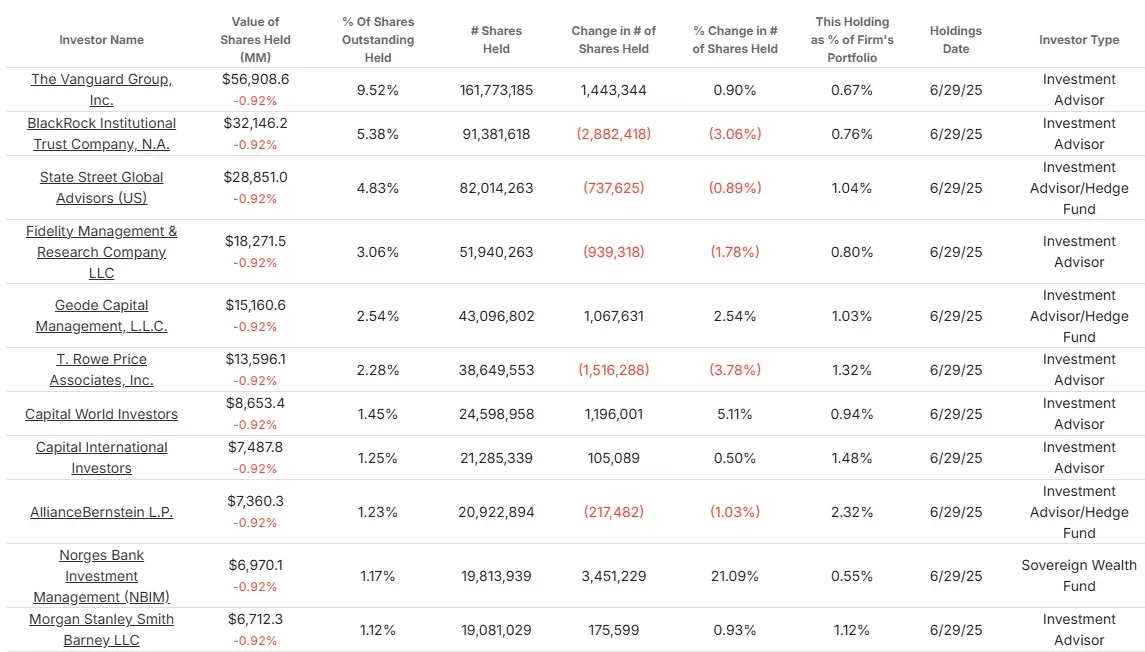Visa (NYSE: V) operates a global payments network that connects consumers, merchants, banks, and governments, making it one of the most important players in the financial system. Its network processes trillions in transactions every year, and shares recently traded around $351 with a market cap of roughly $678 billion, placing it among the world’s most valuable companies.
Once simply a payments processor, Visa has become the backbone of digital commerce, benefiting from the long-term shift toward electronic and cashless payments. Its wide moat, high margins, and ability to scale across new markets make it a core holding for many institutions. Today, Visa’s stock is largely in the hands of passive index giants, while selective active managers and hedge funds continue to adjust their stakes as they weigh valuation against growth prospects.
Looking at who owns Visa and what insiders are doing helps show how the biggest players feel about the stock right now.
Who Are Visa’s Top Shareholders?

See whether Visa’s top shareholders are buying or selling today >>>
Visa operates one of the largest payments networks in the world, and its stock is heavily held by the passive investing giants, while active managers show a more mixed stance.
- Vanguard Group: 161.8M shares (9.52%), ~$56.9B. Added 1.44M (+0.9%).
- BlackRock: 91.4M shares (5.38%), ~$32.1B. Cut 2.88M (-3.1%).
- State Street: 82.0M shares (4.83%), ~$28.9B. Trimmed 738K (-0.9%).
- Fidelity (FMR): 51.9M shares (3.06%), ~$18.3B. Reduced 939K (-1.8%).
- Geode Capital: 43.1M shares (2.54%), ~$15.2B. Added 1.07M (+2.5%).
- T. Rowe Price: 38.6M shares (2.28%), ~$13.6B. Cut 1.52M (-3.8%).
- Capital World Investors: 24.6M shares (1.45%), ~$8.7B. Added 1.20M (+5.1%).
- Norges Bank: 19.8M shares (1.17%), ~$7.0B. Added 3.45M (+21.1%).
One highlight from last quarter is Jane Street Group, which lifted its Visa stake by more than 670% to about 279K shares worth $99 million. That kind of sharp jump suggests the trading powerhouse sees opportunity in the stock.
Another notable move came from Balyasny Asset Management, run by Dmitry Balyasny, which boosted its position by over 440% to roughly 613K shares valued at $218 million. For a multi-strategy fund, that kind of increase looks like a strong expression of confidence.
Meanwhile, Schonfeld Strategic Advisors, led by Steven Schonfeld, more than doubled its stake, raising holdings by 104% to about 28K shares worth $10 million. Though smaller in scale, it still shows a willingness to add exposure to Visa.
Vanguard, BlackRock, and State Street anchor Visa’s shareholder base, keeping it tied closely to global index flows. Norges Bank’s 21% increase may reflect stronger conviction, while reductions from BlackRock and T. Rowe Price suggest some managers view the stock as less attractive at current levels.
Track the top shareholders of over 50,000 global stocks (It’s free) >>>
Visa’s Recent Insider Trades

Insider filings at Visa show that most recent activity has been on the selling side, with executives cashing out shares in the mid-$340s to $370s.
While insider selling is common at large companies and can be tied to preset trading plans or diversification, it still offers a window into how management is handling their personal exposure to the stock. Notably, there have been no sizable insider purchases reported in recent months.
- Julie Rottenberg (Officer): Received and sold 2,027 shares at ~$344
- Chris Suh (Officer): Sold 7,150 shares at ~$344
- Peter Andreski (Officer): Sold 1,688 shares at ~$344
- Ryan McInerney (CEO & Director): Received and sold 10,485 shares as part of compensation at ~$343
- Paul Fabara (Officer): Sold 11,636 shares at ~$375
Insider activity looks more tilted toward selling, which may simply reflect personal financial planning rather than a strong signal about company fundamentals.
The lack of visible insider buying, however, could suggest management is comfortable taking profits but not eager to increase their stakes at current valuations.
See recent insider trade data for over 50,000 global stocks (It’s free) >>>
What the Ownership & Insider Trade Data Tell Us
Visa’s ownership structure and insider moves together paint a picture of stability with selective caution. On one side, passive giants like Vanguard, BlackRock, and State Street keep Visa locked into global index funds, which provides steady demand for the stock regardless of short-term market sentiment.
On the other side, active managers and hedge funds are making more tactical adjustments, with some increasing exposure while others trim back.
Insiders have mostly been selling into recent strength, which could be tied to diversification or preset trading plans rather than a direct signal on Visa’s outlook. Still, the absence of meaningful insider buying suggests leadership may not see the current share price as a bargain.
Visa remains one of the market’s premier compounders, supported by long-term institutional ownership. Active managers are split, and insiders appear more cautious, which may indicate the stock is priced for high expectations rather than undervaluation.
Wall Street Analysts Are Bullish on These 5 Undervalued Compounders With Market-Beating Potential
TIKR just released a new free report on 5 compounders that appear undervalued, have beaten the market in the past, and could continue to outperform on a 1-5 year timeline based on analysts’ estimates.
Inside, you’ll get a breakdown of 5 high-quality businesses with:
- Strong revenue growth and durable competitive advantages
- Attractive valuations based on forward earnings and expected earnings growth
- Long-term upside potential backed by analyst forecasts and TIKR’s valuation models
These are the kinds of stocks that can deliver massive long-term returns, especially if you catch them while they’re still trading at a discount.
Whether you’re a long-term investor or just looking for great businesses trading below fair value, this report will help you zero in on high-upside opportunities.
Click here to sign up for TIKR and get our full report on 5 undervalued compounders completely free.

